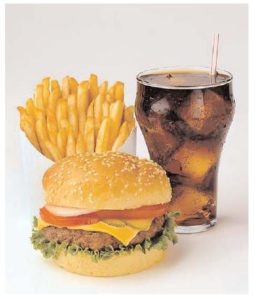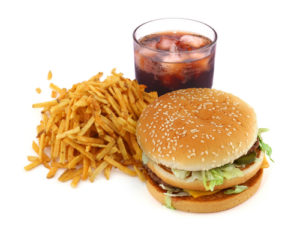 Once again, bad news about ultra-processed foods. American adults eat so much ultra-processed food that it's now about 57% of their daily calories. It's because these foods are convenient, durable, available everywhere, taste good, and frequently are less expensive than whole foods.
Once again, bad news about ultra-processed foods. American adults eat so much ultra-processed food that it's now about 57% of their daily calories. It's because these foods are convenient, durable, available everywhere, taste good, and frequently are less expensive than whole foods.
A large study found that eating lots of ultra-processed foods (e.g., prepackaged foods, fast foods) is associated with a higher risk of colon cancer in men. Specifically, a 29% higher risk when compared to men who ate the least ultra-processed foods.
This association was not found in women.
However, when the researchers looked at specific kinds or categories of ultra-processed foods that were eaten, they found differences in colorectal cancer risk. Higher consumption of meat/poultry/seafood based ready-to-eat-products and sugar sweetened beverages (soda!) was associated with a higher colorectal cancer risk in men. Higher consumption of ready-to-eat/heat mixed dishes was associated with colorectal cancer in women.
But interestingly, eating yogurt and dairy based desserts were negatively associated with colorectal cancer risk in women - it's as if they were protective. Perhaps the beneficial microbes in the dairy foods?
Ultra-processed foods are ready-to-eat or ready-to-heat foods made of little or no whole foods. Instead, they are mostly made of substances derived from foods. They typically have many added ingredients such as additives, artificial colors, preservatives, stabilizers, sugars, artificial sweeteners, salt, flavorings, and hydrogenated fats.
Examples are frozen meals, soft drinks, hot dogs, cold cuts, fast food, packaged foods (including cookies and cake), candies, instant soups, and sweet or savory packaged snacks.
Studies also show that ultra-processed foods cause negative or harmful changes in the gut microbiome (microbial community of bacteria, viruses, fungi). Higher consumption is associated with a higher risk of a number of chronic diseases and cancer.
From Science Daily - New study links ultra-processed foods and colorectal cancer in men
For many Americans, the convenience of pre-cooked and instant meals may make it easy to overlook the less-than-ideal nutritional information, but a team led by researchers at Tufts University and Harvard University hope that will change after recently discovering a link between the high consumption of ultra-processed foods and an increased risk of colorectal cancer. ...continue reading "Ultra-Processed Foods and Risk of Colorectal Cancer"

 A
A